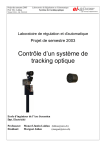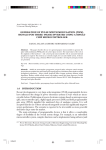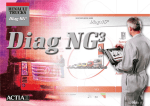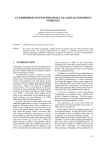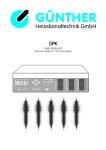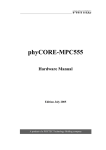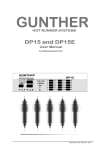Download Compaq I+ME ACTIA NetPorty II User's Manual
Transcript
Welcome to I+ME ACTIA ! Before acquainting you with your new I+ME Hardware we would first like to thank you for purchasing our product. We are extremely pleased that you have chosen to place your trust in I+ME ACTIA and will do our best to satisfy whatever needs you may have. The following is a brief explanation highlighting our background, areas of expertise and general product lines. This products and the list of our world-wide branch offices show that you have found a competent partner in I+ME ACTIA. Since its foundation in 1986, I+ME ACTIA has made quite a name for itself. Our employees are dedicated to producing high-quality solutions in the field bus and multiplexed systems sectors. The knowledge of our experts allows to develop a spectrum of products which have been used in the automotive field as well as in general industrial environments. Our products can be used in all phases of system development: system definition, prototyping, evaluation and field application. I n f o rm at i k u n d M ik ro E l e k t r o n i k Whether your professional background is into industryprocess-control or development and test tools, we offer six product groups to fulfill your sophisticated needs. Tried and tested under the most severe conditions the automotive industry has to offer, our products have proved themselves again and again. Our six products groups are: 1 CAN System Test & Design Tools Support of various user application phases: Learning, prototyping, testing and evaluation of networked systems. Comfortable Real-Time simulation of message transfer characteristics in CAN networks. Tools for mobile diagnosis and tests. 2 CAN PC Interfaces Easy interfacing between PCs, Laptops, notebooks and networks with automotive fieldbus – protocols. Available for all PC standard interfaces such as ISA-slot, PCI, backplane, RS232, Centronics and PCMCIA. Development of applications under DOS/Windows according to RealTime requirements is supported 3 CAN Industrial I/O NiPC is an intelligent hardware concept for sensor / actuator interfacing. A modular architecture allows the flexible change target micro controllers for process control. 4 CAN System Application Software Enabling Real-Time system modeling, testing of networked systems as well as application support. Offering basic services for network communication which is applicable for various processors and programming languages. Facilitating the application interface for distributed industrial process control according to the CAL standard by CiA. Support of Windows 3.1, Windows 95 & NT. 5 CAN System Know How Promoting the understanding of various network protocols in practice. Understanding of CAN networks with CAL in practice. Developing HW/SW solutions for customer specific problems. We offer CAN / CAL workshops and in-house seminars to enable CAN users to benefit from I+ME ACTIA’s extensive knowledge. 6 Automotive Diagnostics Assistance during the development phases. Diagnostic tools for quality control in production lines as well as after sales diagnostic, control and servicing tools are provided to manufacturers, suppliers and dealers of the car industry by I+ME ACTIA. If you have any questions concerning our products or you look for specific solutions within our product groups, don’t hesitate to call us and benefit from I+ME’s extensive knowledge - your need is our desire. Our merger with the french corporation ACTIA in 1995 allowed us to become a powerful supplier for the European automotive industry. ACTIA products include diagnostic systems for automotive service and maintenance as well as development and production of high-quality on-board electronics. joining forces with ACTIA has enabled I+ME to better service it’s international customers not only in Europe, but throughout the world. Headquarter: Office Stuttgart: I+ME ACTIA GmbH Rebenring 33 38106 Braunschweig Germany T: +49 531 38701 0 F::+49 531 38701 88 I+ME ACTIA GmbH Zettachring 4, 1.OG 70567 Stuttgart Germany T: +49 711 72874 45 F: +49 711 72874 46 WORLDWIDE REPRESENTATIVES SI-KWADRAAT NOHAU ELEK. AB I+ME ACTIA INC. NOHAU UK LTD. INDUSTRADE AG AiXIA SA ACTIA SA DAIWA SANKO I+ME ACTIA Representatives SI-KWADRAAT Nuenen, Netherlands T: +31 40 2631185 F: +31 40 2838092 ACTIA SA Toulouse, France T: +33 05 61176161 F: +33 05 61554231 NOHAU ELEK. AB Malmö, Sweden T: +46 40 592200 F: +46 40 592229 ACTIA INC. Bedford, Texas USA T: +1 817 5710435 F: +1 817 3559513 If needed, please contact our associates below. ATAL SPOL SRO Tabor, Czech Rep. T: +420 361 251791 F: +420 361 23043 ACTIA DO BRASIL Porte Alegre, Brazil T: +55 51 9699802 F: +55 51 3411989 ATON SYSTEMS SA France T: +33 01 42071800 F: +33 01 42078555 ACVIBUS SA Mexico T: +525 368 6169 F: +525 368 5646 VIDEOBUS SA Madrid, Spain T: +34 1 5001950 F: +34 1 5000607 Manual NetPorty II Contents 1 Introduction......................................... 1-1 1.1 1.2 1.3 Your I+ME NetPorty II ......................................1-2 System Requirements ......................................1-4 Delivery Contents .............................................1-5 1.3.1 Standard................................................ 1-5 1.3.2 Supplementary Support ........................ 1-5 1.4 Technical Specifications ...................................1-6 2 Installation........................................... 2-1 2.1 2.2 2.3 Overview...........................................................2-2 Installing the Hardware.....................................2-2 Installing the Software ......................................2-4 2.3.1 If you start at serial port ........................ 2-4 2.3.2 If you start at parallel port ..................... 2-5 3 Hardware ............................................. 3-1 3.1 3.2 Micro controller .................................................3-2 Memory.............................................................3-3 3.2.1 NetPorty II internal buffers: ................... 3-3 Protocol Interface .............................................3-4 Physical Interface .............................................3-5 Optical interface................................................3-5 Connector .........................................................3-6 3.6.1 9pol sub-min-D male............................. 3-6 3.6.1.1 1 CAN Channel.................................. 3-6 3.6.1.2 More than 1 CAN Channel ................ 3-8 3.6.2 25pol sub-min-D male......................... 3-10 3.6.3 Cable set for serial connection............ 3-11 3.6.4 Power Supply ...................................... 3-12 3.3 3.4 3.5 3.6 4 Troubleshooting & Techn. Support... 4-1 4.1 What to do if you have problems......................4-2 4.1.1 Solutions for all parts ... ........................ 4-3 4.1.2 Solutions for PCMCIA ........................... 4-4 1.1.1 Non-Supported PCMCIA Drives ........... 4-5 4.1.3 Solutions for NetPorty II ........................ 4-6 5 6 Glossary .............................................. 5-1 Literature ............................................. 6-1 A B C LevelX API LevelX Demos PcCANControl Administration of Document Document version: 1.05 Your I+ME NetPorty II. Overview, Systemrequirements, Delivery contents and s.o. 1 Introduction Introduction Your I+ME NetPorty II 1.1 Your I+ME NetPorty II The NetPorty II is an improved portable network adapter. It is designed to connect devices with RS232 or Centronics interface to the CAN bus. With its features it is an ideal general purpose hardware for industrial and automotive analyzes and diagnostics. With NetPorty II you can visualize bus-traffic and configure components within a CAN network. It enables you to transfer software from or to control components. The data can be exported to readable by standard PC programs like Excel. In this way the user can generate statistic diagrams, etc. to analyze the CAN communication. In the I+ME standard software you can set bus specific values. For transmitted or received data it is possible to assign fix display to one CAN message. In addition to the above mentioned features you can transfer your own programs to NetPorty II by the use of the RS232 link. The download utilities are included as well as sample programs. The NetPorty II can optionally be equipped with an UART for automotive diagnosis. In this case it is a converter RS 232 or Centronics to ISO 9141 (K-Line). Working with the parallel port is 2..5 times faster as the serial port access. The speed depends on the PC speed. Version 1.03 1-2 Introduction Your I+ME NetPorty II I+ME ACTIA is always eager to full fill the needs of our customers. If problems should occur, please refer to Troubleshooting. If the problem persists, then feel free to contact our after-sales support hotline using the following number: After-sales service * I+ME ACTIA GmbH Rebenring 33 D-38106 Braunschweig Germany. Tel: ++ 49 (531) 38 701 38 Fax: ++ 49 (531) 38 701 88 e-mail : [email protected] Version 1.03 1-3 Introduction System Requirements 1.2 System Requirements PC requirements: • standard PC with RS232 or Centronics (EPP 1.7 or 1.9) interface • other device with standard RS232 interface (used signals described in chapter Hardware) Version 1.03 1-4 Introduction Delivery Contents 1.3 1.3.1 Delivery Contents Standard Your NetPorty II delivery package (Order code: IME 1602401) includes: • 1 NetPorty II • 1 System user manual (hardware/software) • Transfer tools to NetPorty II • LevelX software driver for design of 32 bit Windows applications (Windows '95 and Windows NT), including sample programs running on standard firmware • PCCANControl for Windows, Windows '95 and Windows NT version • RS232 adapter cable set 1.3.2 Supplementary Support • Power supply • Different cables for protocol interfacing (on request) Version 1.03 1-5 Introduction Technical Specifications 1.4 Technical Specifications General Characteristics of NetPorty II Processor Protocol Interface Physical Interface Memory Temperature Range Connector Housing Display Dimensions Power Supply Version 1.03 1-6 80C165, @36,84MHz 1 x SJA1000, @ 16 MHz 1 x 82527, @16MHz 1 x UART CAN: according to ISO 11898 (PCA 82C251) 512 x 16 KByte RAM, 128 x 8 KByte Flash 0° .. .+ 55 °C 9pin sub-min-D CAN according to CiA/DS 102 plastic, protection class IP30 3 DUO-LED 95.5 mm x 41 mm x 20 mm 7 - 32 V DC external power supply jack or via CAN bus connector, typically max.500 mA at 7 V DC with physical interface PCA 82C251 Introduction Technical Specifications Options Memory Physical interface: Diagnosis Channel CAN Cable Power supply Firmware 64 KB EPROM instead of flash ISO Low Speed (ISO 11519) ISO 9141 physical interface CAN optional galvanic disconnect 1 m Cable for adaptation 230 V/AC to regulated 8 V/DC 110 V/AC to regulated 8 V/DC Individual firmware on request Version 1.03 1-7 Installing your NetPorty II. Step by step installation procedures for hardware and software. 2 Installation Installation Overview 2.1 Overview This chapter gives detailed information about installing the NetPorty II hardware and about the necessary software drivers which make NetPorty II access possible. The NetPorty II is delivered with access driver and applications for Windows 95 and Windows NT. To get your NetPorty II operational follow the installation guide lines. 2.2 Installing the Hardware To install the hardware you should connect the NetPorty II to the serial or to the parallel port of your PC. If the NetPorty II operates at the serial port of the PC the adapter cable will be used to get the right signals. Plug in the 25 pin D-Sub connector of the adapter cable to the NetPorty II and the 9 pin D-Sub connector to the serial interface of the PC. The NetPorty II can operate at the parallel port which 1 must be configured as EPP (V1.7 or V1.9) mode. 2 ECP .mode is not supported. Make sure that the right interrupts are used in the systems configuration and the BIOS settings. 1 2 EPP: Enhanced Parallel Port ECP: Extended Capabilities Port Version 1.03 2-2 Installation Installing the Hardware It is also necessary to connect the NetPorty II with a power supply. Therefore an external power unit can be used to supply the NetPorty II via the power connector or via the 9 Pin D-Sub CAN-connector. Centronics CAN Power supply Serial RS232 If all connections are done NetPorty II is operational and the next step is the software installation. Version 1.03 2-3 Installation Installing the Software 2.3 Installing the Software 2.3.1 If you start at serial port Driver installation: 1 Insert the CD. The setup programm will start automatic, if not please start the program “START.EXE” in root path. 2 Go to "Software Installation" 3 Choose your operating system, is important. 4 Choose your hardware component at the selection box then press "Start Installation". If the file is started (*.com file), follow the steps on the screen. If necessay type in the password. 5 If password is correct software will be installed successful. Application installation: 1 Insert the CD. The setup programm will start automatic, if not please start the program “START.EXE” in root path. 2 Go to "Software Installation" 3 Choose your operating system, is important. 4 Choose PcCANControl component at the selection box then press "Start Installation". If the file is started (*.com file), follow the steps on the screen. If necessay type in the password. 5 Start PcCANControl, select “create a new project” and the NetPorty II hardware, at this case “Porty2COM1” or “Porty2-COM2”. After the selection the necessary NetPorty II software is activated on your PC. For further information see also chapter about PcCANControl. It is not necessary to install a driver. The software works with the standard Win32 serial communication services with 115200bps, 8 bits, no parity, 1 stop bit. Version 1.03 2-4 Installation Installing the Software Problems: It is possible you chose an incorrect COM port. Start PcCANControl again and choose an other COM port. 2.3.2 If you start at parallel port 1 Make sure that your PC parallel port uses the EPPmode. You have to control it under BIOS setup. In this version the NetPorty II supported the EPP versions 1.7 and 1.9. If necessary configure your PC and re-start it. 2 Follow steps 1-5 under chapter 2.3.1. 3 Configure the right driver. Change to directory “.. / I+ME ACTIA / CANctrl-PTY / ParDrv95 (.. / ParDrvNT) and start the batch-file Drvinst.bat 4 At this point you have to reboot your PC to start the right driver. 5 Install PcCANControl, follow steps 1-5 under chapter 2.3.1 Application installation. Problems: (see also chapter troubleshootings) You start PcCANControl but the connection doesn’t work: For parallel port usage it is necessary to have the EPPloader-firmware (BOOTLOAD.H86) in the NetPorty II Flash-EPROM. All Porty's are delivered with this loader but it is possible that you have overwritten it by your own firmware. In this case it is possible to download the EPP-firmware again into the NetPorty II -Flash. Version 1.03 2-5 Installation Installing the Software This software is a Win32-Console-Application and runs under Win95 and WinNT. Usage: - Connect your NetPorty II with one serial port. - If you do not use COM1 please change it into the file L.BAT. - Start L.BAT. - If you get error messages like "BSL: no response from the target hardware" it is possible that you have used the wrong COM port. - If you get the message below "-- COMx Loading bootload.h86..Ready" without any error message in the next line, all activities are correct finished - Leave the software with pressing the ESC key, sometimes Alt X does not work. Info: The program LDFSER.EXE is a loader that burns firmware in the Porty-Flash and also it is a serial monitor to display firmware print-outs. The serial parameter are 115200,8,n,1. I+ME also can deliver a loader to start firmware in the RAM and a little firmware demo (Keil-C). Please contact us if you want to develop your own firmware. Version 1.03 2-6 The technical components, there specifications and the way they work together. 3 Hardware Hardware Micro controller 3.1 Micro controller The I+ME NetPorty II includes the 16-bit Siemens 80C165 micro controller on a piggy back. The controller’s clock frequency is 36,84MHz. The following recourses are used: Port 2.14 [EX6IN] Port 2.15 [EX7IN] CS0-CS1 CS2-CS3 CS4 Version 1.03 3-2 SJA1000 82527 / 16CS550 Memory Protocol interface LED latch Hardware Memory 3.2 Memory The I+ME NetPorty II is equipped with Flash (CS0) 128 KByte (x 8 bit) SRAM (CS1) 512 KByte (x 16 bit) Optional it can be equipped with Flash 512 KByte (x 8 bit) and RAM 128 Kbyte (x 16 bit) 3.2.1 NetPorty II internal buffers: To avoid lost data (CAN is faster than the communication channels to the PC) the transfer-objects are buffered in the NetPorty II. The biggest buffer is between CAN reception and the communication channel to the PC (448kByte). If you have many traffic on the CAN-bus and the buffer is full it takes a time of several minutes to transfer the data to the PC. You can control this with the 2nd NetPorty II LED that blinks faster while the data transfer. Version 1.03 3-3 Hardware Protocol Interface 3.3 Protocol Interface The product has two CAN protocol chips at a frequency of 16 MHz. The SJA1000 chip is connected to the 9 pin D-SUB connector with the CiA pinning. The optional 82527 is also connected to the 9 pin D-Sub connector without physical line driver. The C165 uses the CS2 signal to select the SJA1000. The NetPorty II can be equipped with a second CAN channel. Therefore a 82527 will be mounted on the PCB. The C165 uses the CS3 signal to select the 82527. If 2 CAN channels are used there is no standard pinning at the D-Sub connector. The physical line driver for the second CAN channel is available via the connecting cable (not included in standard delivery contents) and can be used optional by your special application. In stade of the second CAN channel a diagnosis channel can be used. Therefor an UART 16CS550 can be mounted on the PCB instead of the 82527. The C165 uses the CS3 signal to select the UART. The physical line driver for the ISO 9141 interfacing can be ordered separately Version 1.03 3-4 Hardware Physical Interface 3.4 Physical Interface NetPorty II has the transceiver chip 82C251 (according to ISO 11898) as physical interface. It is not galvanic disconnect. The standard physical interface is linked to the SJA1000, the Output Control Register must be set to 0xFA. To connect the second CAN channel or the ISO 9141 channel an optional physical line driver have to be ordered. 3.5 Optical interface State of LED during download firmware: At serial download: At parallel download no fixed state. LED 1 green LED 2 green (flashing) State of LED during work: Color Red green LED 1 Life cycle flash 1.Life cycle flash LED 2 Flashing during RS232/Parallel data transfer 2. Data transfer LED 3 Bus off Bus on 3. BUS on/off Version 1.03 3-5 Hardware Connector 3.6 Connector 3.6.1 3.6.1.1 9pol sub-min-D male 1 CAN Channel The CAN connector is based on the CiA standard if only one CAN channel is used. It is a 9pol sub-min-D male connector. Figure 3-1 Standard CAN Connector Pins 1, 4 and 8 are not used by NetPorty II Version 1.03 3-6 Hardware Connector Pin Signal 1 nc 2 CAN_L 3 CAN_GND 4 5 nc CAN_SHIELD 6 7 POWER_GND CAN_H 8 9 nc POWER_V+ Description not connected CAN_L bus line (dominant low) CAN ground (connected on the cable shield) not connected CAN ground (connected on the cable shield) power supply input ground CAN_H bus line (dominant high) not connected power supply input +7..32V The power input and the CAN lines are galvanic disconnect with a limit to ± 50V. There is an internal transzorb diode to limit the disconnect voltage. If you don't need a galvanic disconnect, the pin 6 can be connected to pin 3 or 5. The POWER_GND pin 6 is not connected with the CiA standard bus in every system. If the tool does not work, pin 6 could have to get connected to the power supply ground! Version 1.03 3-7 Hardware Connector 3.6.1.2 More than 1 CAN Channel The pinning is different if more than one CAN channel is used. Figure 3-2 Pinning for more than 1 CAN channel Version 1.03 3-8 Hardware Connector Pin Signal 1 Uni_Out2 2 CAN_L 3 CAN_GND 4 Uni_Out0 5 CAN_SHIELD 6 7 POWER_GND CAN_H 8 Uni_Out1 9 POWER_V+ Description Connected to Port 6.7 CAN_L bus line (dominant low) CAN ground (connected on the cable shield) Connected to Port 6.5 or UART Rx or CAN2 RX0 CAN ground (connected on the cable shield) power supply input ground CAN_H bus line (dominant high) Connected to Port 6.6 or UART Tx or CAN2 TX0 power supply input +7..32V Pin 1, 4 and 8 are used to provide the additional signals for the second CAN channel or the UART. In standard version the inputs are protected. Port 6.5, Port 6.6 and Port 6.7 are used as additional signal line. In case of standard version the ports are protected. Version 1.03 3-9 Hardware Connector 3.6.2 25pol sub-min-D male To connect the NetPorty II with the PC it is possible to use the Centronics (LPT) port directly or to use the adapter cable to use the RS232 (COM) port. In both cases the pinning of the 25pol sub-min-D male is the same. Connector definition: Pin 1 2 3 4 5 6 7 8 9 10 11 12 13 14 15 16 I/O Input Input Input Input Input Input Input Input Input Output Output Output Output Input Output Input 17 18 19 20 21 22 23 24 25 Input X Input Output Input Output Input Output Input Version 1.03 3-10 Usage Parallel Parallel Parallel Parallel Parallel Parallel Parallel Parallel Parallel Parallel Parallel Parallel Parallel Parallel Parallel Both Description Strobe D0 D1 D2 D3 D4 D5 D6 D7 /acknlg Busy Paper empty Slct /autofd /error high -> RESET; low -> Operational /init DTR (Porty RESET in): switch level 2.5V input range -40..+40V, low speed 10ms A weak pull-up and pull-down is necessary to define with special mounting whether the reset line is active or not if this line is not connected. Parallel /slct in Both Ground Serial TX (PC -> Porty) Serial RX (Porty -> PC) Serial RTS Serial CTS Serial Free input (DTR) Serial DSR Serial Free input (as serial master it can be used as CD or RI) and also optional power input source Hardware Connector 3.6.3 Cable set for serial connection Cable length: 30cm 25 pin female 23 20 19 16 18 24 21 22 25 9 pin female 1 2 3 4 5 6 7 8 9 Signal CD Rx Tx DTR GND DSR RTS CTS RI Version 1.03 3-11 Hardware Connector 3.6.4 Power Supply The NetPorty II can be powered by an external power supply Therefore the connector is specified for the power supply jack below: The power connector is a DC3.5/1.3 mm type. That means the internal diameter is 1.3mm. Ø3,5mm min. 9,0mm Figure 3-3 Power Connector for NetPorty II Version 1.03 3-12 Common problems and how to solve them. How to get in touch with our after-sales support experts if you so desire. 4 Troubleshooting & Techn. Support Troubleshooting & Techn. Support What to do if you have problems 4.1 What to do if you have problems First and foremost, please read Installation very closely and make sure that you performed your installation exactly as described. For developers: The Key is often used in developing environments in combination with the API and/or DLL. If the PcCANControl software is functioning properly, then there is no problem with general CAN access. You should check your usage of the API of DLL. If the PcCANControl software is not functioning, please consult the list of common problems below and their possible solutions. Version 1.03 4-2 Troubleshooting & Techn. Support What to do if you have problems 4.1.1 Solutions for all parts ... The system crashes after choose the hardware at PcCANControl: The selected memory area is not free, or the selected interrupt is being used by another application. Make sure that no conflicts exist on your system. If you get a blue screen under Win NT it is most likely that a memory or IRQ conflict is occur. PcCANControl launches correctly, but CAN access is not possible: Check the transceiver cable and CAN connectors. If a connector is not correctly plugged, connect it right. If the sub-min-D connectors at the end of the cables are hot, remove the Key and call I+ME. If you use higher baudrates, remember to protect the end of line with resistors [120Ohm] Version 1.03 4-3 Troubleshooting & Techn. Support What to do if you have problems 4.1.2 Solutions for PCMCIA The system crashes after the installation of the Key client: The selected memory area is not free, or the selected interrupt is being used by another application. Refer to Installation. The system crashes when the Key is inserted or removed: The selected memory area is not free, or the selected interrupt is being used by another application. Refer to Installation. Windows will not launch after the installation of the client and services: Make sure that there is a memory area reserved in the SYSTEM.INI file. The selected memory area is not free, or the selected interrupt is being used by another application. Refer to Installation. The acknowledge sound after inserting or removing the Key is sounded twice: There are two services installed on your system. One can be found in the CONFIG.SYS and the other in the device manager. In the device manager, under the topic PCMCIA, you can disable one of the services. The Key is not inserted and PcCANControl starts with the message: I+ME CARD not available or drive not ready. Insert the Key. Version 1.03 4-4 Troubleshooting & Techn. Support What to do if you have problems The Key is inserted and PcCANControl starts with the message: I+ME CARD not available or drive not ready. Some aspect of the resource allocation is wrong. Refer to Installation for more information. 1.1.1 Non-Supported PCMCIA Drives In the current version there are some PCMCIA drives which are incompatible with the PCMCIA Key. Today, as a general rule, some PCI connected drives result in compatibility problems. The following is a list of known incompatible drives and any laptops which are known to use these drives. Drive Cirrus Logic PCIC compatible Known Laptops Using Drive SIEMENS NIXDORF Scenic Mobile 700 COMPAQ Armada Version 1.03 4-5 Troubleshooting & Techn. Support What to do if you have problems 4.1.3 Solutions for NetPorty II You start PcCANControl but the connection doesn’t work correct: For parallel port usage it is necessary to have the EPP-loader-firmware (BOOTLOAD.H86) in the NetPorty II -Flash-EPROM. All Porty's are delivered with this loader! You have overwrite the delivered EPP-Loader by your own firmware. In this case it is possible to download the EPPfirmware again into the NetPorty II -Flash. This software is a Win32-Console-Application and runs under Win95 and WinNT. How to use: - Connect your NetPorty II with one serial port. - If you do not use COM1 please change it into the file L.BAT. - Start L.BAT. If you get an error messages like "BSL: no response from the target hardware" it is possible that you have used the wrong COM port. - If you get the message below "-- COMx Loading bootload.h86..Ready" without any error message in the next line, all activities are correct finished - Leave the software with pressing the ESC key, sometimes Alt X does not work. Info: The program LDFSER.EXE is a loader that burns firmware in the Porty-Flash and also it is a serial monitor The serial parameter are 115200,8,n,1. I+ME also can deliver a loader to start firmware in the RAM and a little firmware demo (Keil-C). Please contact us if you want to develop your own firmware. Version 1.03 4-6 Troubleshooting & Techn. Support What to do if you have problems The NetPorty II doesn’t work under parallel port: Use the right EPP mode on BIOS. It can be only one of the EPP modes work with one Win-System together. In past we find out that EPP 1.7 is necessary for Win9x and EPP 1.9 is necessary for Win NT. Please try out the right mode. Using a printer and NetPorty II under Win NT: If you use NetPorty II under NT note that you are not able to print! Using a printer and NetPorty II under Win 9x: If you use NetPorty II under Win9x the normal printer driver is active but it can make problems while printing with the active driver.! One way to solve this problem is to load the firmware into the flash of the NetPorty II. Version 1.03 4-7 Troubleshooting & Techn. Support What to do if you have problems If you encounter difficulties which are not discussed in the manual, or if you need more help than is offered in Installation and Troubleshooting, please call our after-sales service. Our experts will do their best to solve whatever problem you might have. Version 1.03 4-8 For better understanding... 5 Glossary Glossary Glossary Adapter A piece of hardware which contains one or more PCMCIA sockets.The Adapter contains the interface between the Socket Controller and the Host System. AUTOEXEC.BAT A set of commands in the form of a batch file program that are automatically executed by DOS to help configure your system when you Boot-Up your computer. BIOS An abbreviation for Basic Input/Output System. A set of instructions/routines stored in ROM. These routines work closely with hardware devices (memory chips, disk drives and monitor) to input and output interrupt requests indicating when a device is ready to accept or send data. CONFIG.SYS A system configuration command file that contains installable device drivers, memory management commands and control files that DOS accesses and uses when your system starts up. DPRAM Dual Ported Random Access Memory. The data for communication between PC and CANcard are exchange via a DPRAM. 5-2 I/O An abbreviation for lnput Output. Refers to the sending (input) and receiving (output) of data through an 110 channel in the CPU. Example: The keyboard inputs data to the 110 channel in the CPU that in turn is output to the monitor. IRQ An abbreviation for Interrupt Request. A signal sent by a device and routed through the BIOS indicating when a device is ready to accept or send data. PCMCIA Personal Computer Memory Card International Association, a trade association of leading hardware and software vendors, established to adopt a set of standards pertaining to adapter slots and PC cards for portable PC accessories. Slot A receptacle on a micro, portable, laptop or palmtop computer that is used to insert and operate PCMCIA PC Cards. Also referred to as a Socket. Socket Same as Slot (see above). Glossary Socket-Controller A PC system hardware component that manages the operation of PCMCIA sockets in conjunction with system software. SYSTEM.INI A Windows initialization file (similar to the CONFIG.SYS file for DOS) that contains Windows device drivers, commands and settings you can use to customize Windows for your system's hardware. Upper-Memory Memory area within the PC address space between 640 KB and 1 MB. This area is used by hardware devices like graphics controller. The DPRAM of the CANcard is located in the Upper Memory. V 1.00 5-3 For more informations ... 6 Literature Literature Literature [1] SAB 80C167CR User Manual Siemens AG. [2] SAB C167CR Description of the On-chip CAN-Module Siemens AG. [3] CiA DS 102-1CAN in Automation e.V 6-2



















































